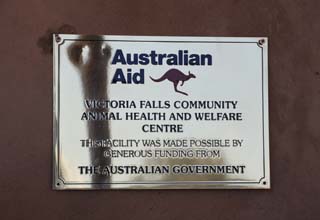The Key to conserving wildlife is to ensure that the people who live at the interface with wildlife see the benefit of having it around. Many rural communities are often affected by diseases that can be transmitted between wildlife and domestic animals. A key objective for Victoria Falls Wildlife Trust is to improve the health of both wildlife and domestic animals. In addition, for many years the Trust has had a need for a clinical facility for the wildlife rescue cases that come in needing additional veterinary care.
Many rural communities are often affected by diseases that can be transmitted between wildlife and domestic animals.
We are very happy to have opened the doors in 2016 to the Victoria Falls Community Animal Health and Welfare Centre (CAHWC). This Centre is situated in the Monde rural community living adjacent to Victoria Falls. It serves the rural community as a facility to treat their domestic animals and livestock in an effort to improve the livelihoods of the people living alongside wildlife. If subsistence farmers are able to have healthy livestock as a source of income or protein, they are less likely to poach and poison wildlife.
The CAHWC is also the clinical facility for rescued wildlife cases at the Trust that need surgical care or treatment when they come in for rehabilitation.
This project is a joint collaboration with Veterinarians for Animal Welfare Zimbabwe (VAWZ). VAWZ oversee the day to day operation at the Centre and deal with the all of the domestic animal and livestock cases that come in for veterinary care.

Cost of Care
The Victoria Falls Wildlife Trust together with VAWZ try and vaccinate every dog in the urban and rural areas around Victoria Falls annually. This is free of charge and a major campaign to try and ensure we do not have rabies cases in the area. Rabies is a viral disease that kills people, wildlife and domestic animals every year in Zimbabwe. It is a disease that is completely preventable. If we can vaccinate 75% of the dog population we can keep rabies at bay. Distemper, and tick borne diseases are also some of the diseases that can cause mortalities in dogs and spillover into wildlife.
The average lifespan of a dog in the rural areas of North -West Zimbabwe is 3 years. This is due to primarily to disease and poor nutrition. We try and improve animal health at the Centre.
If you would like to support us, you can Donate Online: a $50 donation will sterilize, vaccinate, and dip one female dog.




